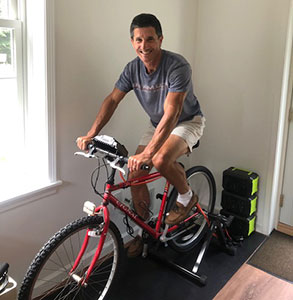Zero-Carbon House is the Goal to Help Maintain the Health of the Planet
Opinion Advocates for ideas and draws conclusions based on the author/producer’s interpretation of facts and data.

By Michael Gold
Bill Gerosa may not have achieved a zero-carbon emitting household yet, but he’s trying hard to get there.
Gerosa has installed both a geothermal system to heat and cool his house and 55 solar panels on the roof of his Pleasantville home, which have reduced his electric bills dramatically. He also has two solar panels in his backyard, which his family uses to charge their cell phones.
Walking from my car to Gerosa’s house on a late July day, with heatwave temperatures predominating, I felt like I was walking through a bowl of atomic chili.
But his house was cool, and he wasn’t burning any fossil fuels to make it comfortable.
“I’m sending more electricity to the grid than I’m using, six months of the year,” Gerosa told me.
Gerosa is not the kind of guy I imagined who would care so much about the environment. He studied economics and computer science at Boston University and has an MBA from Columbia, then worked in risk, capital and asset management for large financial corporations, including Bloomberg, Citibank and Deutsche Bank.
He’s had an entrepreneurial streak from childhood on. In seventh grade, Gerosa, who grew up in North Tarrytown (now Sleepy Hollow), learned how to program in the BASIC language, then created two video games for a Timex Sinclair computer and sold them to the company, one a knockoff of Space Invaders, the other of Haunted House. His father had to sign the contracts because Gerosa was only 13 years old at the time. He liked bats, so in 1997 he designed a bat detector to listen to their navigational echolocations and sold it online.
“I’ve sold lots of them,” Gerosa said, including one to the Emperor of Japan. “I’ve tried to convert things I like into viable businesses.”
He also built a bicycle stand that generates electricity, called “Pedal-A-Watt.” He took a bike, put a generator on a bike stand and produced electricity from pumping on the pedals.
“Some customers had kids use it to watch TV. I’ve gone into classrooms and let kids go on the bike, to see how hard it is to produce electricity with human power,” Gerosa said.
Gerosa and his daughters build the bike stands themselves in their house when they get an order. They sold almost 50 bike stands in 2022. Forty-five bike stands were used at the 2008 Super Bowl to charge a battery bank during part of the pre-game show, he said.
Gerosa has used his analytical skills to understand the climate issues humanity faces.
“The environment is the most important thing we have. We’re going to have more storms that are worse. The data is the data. We know that these things are changing. We should call it ‘radical climate change,’” he said. “We do have to stop pumping elements that don’t belong in our atmosphere that Mother Nature never intended.”
Gerosa owns a Dandelion geothermal heat pump (I do as well). The system works like this: In the summer, it takes heat from the air in your house and moves it into the ground. In the winter, it takes heat from the ground and moves it into the home.
“It’s easier to move heat than to create heat from scratch,” and it uses much less energy to do it, Gerosa said.
He spends most of his time now managing his family’s investments.
“I’m investing in the environment, biotech and computational tech,” he said.
He’s putting money into alternative energies, including solar, wind, hydro, tidal, battery storage and distribution and smart electric grid technology, which focuses on how the grid is managed for maximum efficiency. That saves money and reduces carbon emissions.
When I asked him if he was investing in carbon capture technology, he said, “The best carbon capture is trees.”
Gerosa is also investing in sustainable farming and tree planting projects.
“We’re pumping more carbon dioxide than ever and deforesting more than ever,” he said.
The owner of two Ford Explorers that he and his family each drive 11,000 to 12,000 miles per year, he told me, “I really want to buy an electric car.”
Perhaps it was Gerosa’s Jesuit education at Fordham Prep in the Bronx that has given him his philosophical tendencies.
“Our instincts worked well for us in ancient times, but not now. We are resource aggregators,” he said, which I think means we keep wanting more and more things. “It gives us a better chance of having offspring.”
However, in today’s world, “Americans are always running. You get the Porsche, six months later, you want the Lamborghini. We need to appreciate what we do have.”
Gerosa’s philosophy is based in part on this: “When you order things in terms of importance, health is number one. The environment is the health of our planet.”
Pleasantville-based writer Michael Gold has had articles published in the New York Daily News, the Albany Times Union, The Virginian-Pilot, The Palm Beach Post and other newspapers, and The Hardy Society Journal, a British literary journal.

Examiner Media – Keeping you informed with professionally-reported local news, features, and sports coverage.
